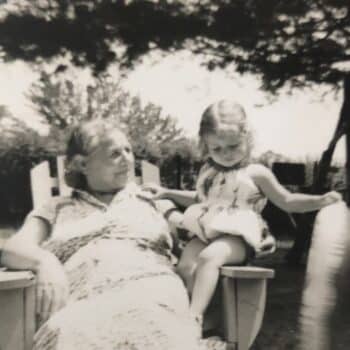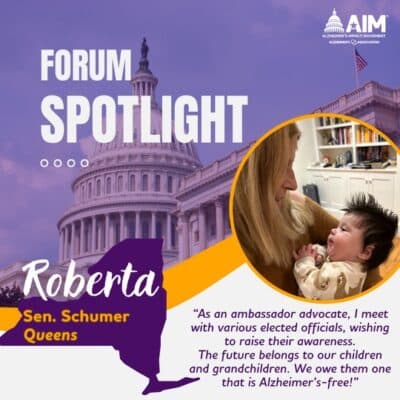Roberta Morris

Little did I know that my grandmother’s illness was about to change my life forever. Since my parents worked full time, I suddenly went from a carefree child to an eight year old caregiver; a huge responsibility for anyone, especially a child.
July 3, 2024
Roberta Morris became a caregiver to her grandmother living with Alzheimer’s when she was just 8 years old. Today she is the Alzheimer’s Association’s New York State Ambassador Advocate, working with Senator Charles Schumer and Representative Thomas Suozzi.
I am the Alzheimer’s Association New York State Ambassador Advocate, working with Senator Charles Schumer and Representative Tom Suozzi. I have been an advocate volunteer for nearly five years. I want to raise awareness of Alzheimer’s among elected officials, but my reasons for getting involved go much deeper. When I was eight years old my grandmother was diagnosed with hardening of the arteries in the brain, which back then was not considered a part of Alzheimer’s disease. In fact, not much was known about Alzheimer’s at all. Little did I know that my grandmother’s illness was about to change my life forever. Since my parents worked full time, I suddenly went from a carefree child to an eight year old caregiver; a huge responsibility for anyone, especially a child. My brother, eight years older than me, became a caregiver as well.
Prior to her dementia, my grandmother and I were particularly close. We shared many special moments. Each Friday, I would stand on a stool to watch as she prepared dinner, which included two apple pies — one large; the other a smaller version which she said I helped make. Did I really help? Who knows. I only know that she and I shared those moments. Baking those pies was only one version; she was my guardian while my parents were at work. Suddenly, I became her guardian.
This impacted me a great deal. My grandmother no longer recognized me, my family, her surroundings, or herself. Caring for her affected all of us physically, emotionally, and financially. There was no education, no information, no outreach, and no support.
Over the years, I kept up with the research. We now know that hardening of the arteries in the brain is one form of Alzheimer’s disease. We also know that lifestyle changes may positively affect the progression of Alzheimer’s. There are prescription drugs available to help manage the symptoms. And we now have FDA-approved Lacanemab, which may slow the rate of cognitive decline in those who have early-onset Alzheimer’s disease.
Currently, an estimated 6.7 million Americans are living with Alzheimer’s disease, two thirds of whom are women. While at this time there is no definitive answer, it is believed that hormones are a major factor. Meanwhile, over 11 million people provide unpaid care for people with Alzheimer’s disease or other dementias — and two thirds of those are also women.
The Caregiving Youth Research Collaborative (CYRC) published an article about young people who are caregivers. It said that an astounding, yet conservative, estimate is that 5.4 million children under 18 in the US are caregivers to various family members. Supported by the University of Miami’s Miller School of Medicine, the report shows that many of these children take on adult responsibilities with little or no support. I can identify all too well with those children. Not much has changed in that regard, except, perhaps, that the numbers have grown astoundingly.
As an Ambassador Advocate I help the Alzheimer’s Association achieve its federal policy priorities, including funding Alzheimer’s research and other programs. I work to raise awareness on behalf of Alzheimer’s patients and their caregivers, provide quality healthcare and ongoing support and enactment of legislation. We have come a long way, but still have a long way to go. It is gratifying to know that, in a small way, I have helped raise awareness of Alzheimer’s disease by discussing public policy and the necessity to continue funding research with elected officials.
